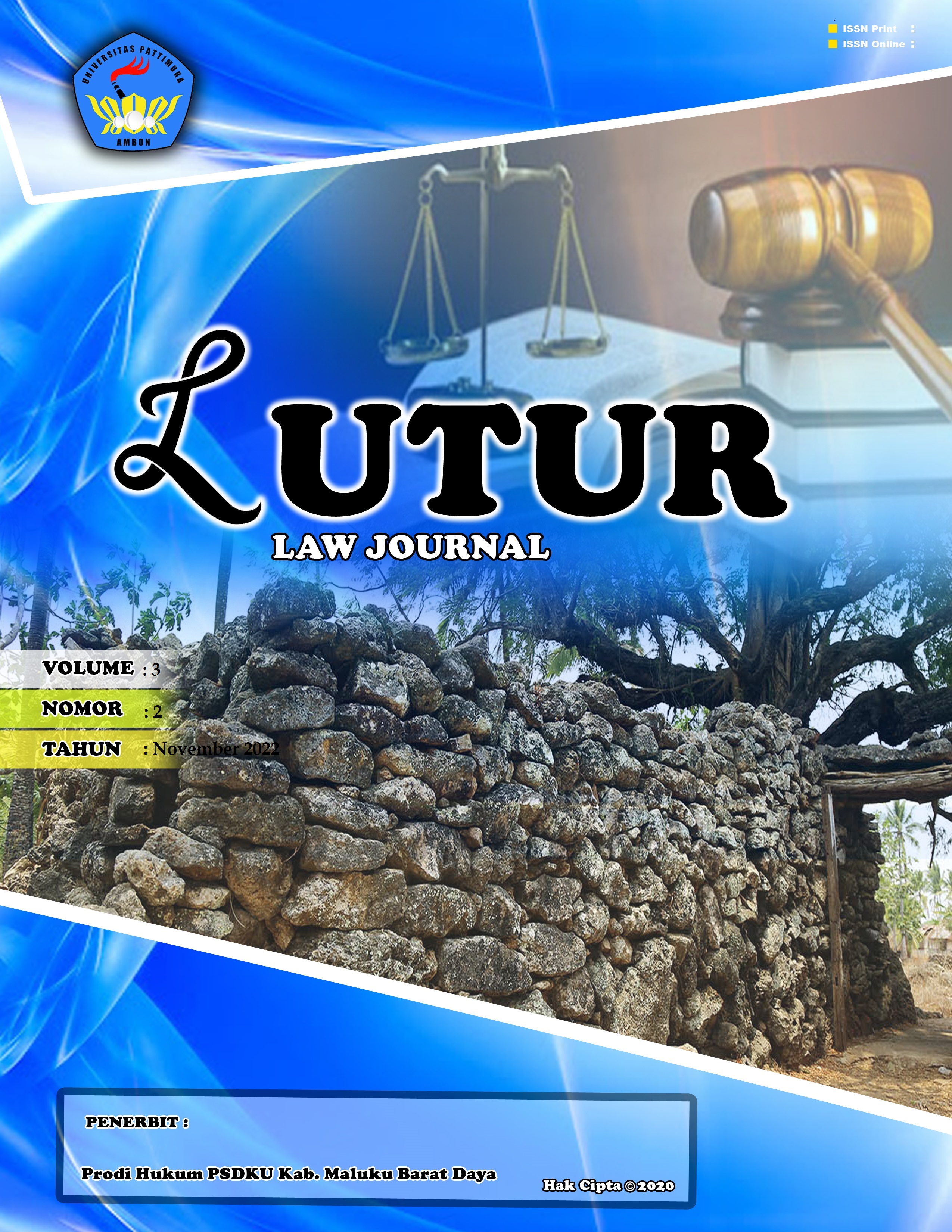Tanggung Jawab Pemerintah Daerah Kabupaten Maluku Barat Daya Dalam Pengelolaan Wisata Pantai
Abstract
Authority to the Regency Regional Government in managing Beach Tourism to provide benefits for people's welfare, equality, proportionality, justice, maintaining natural and environmental sustainability, empowering local communities. This research is a normative juridical research on this problem and then examines and knows the answers to this problem through a conceptual approach, statutory approach then from the results of the description conclusions and suggestions can be drawn. The results of the study show that the Regional Government of Southwest Maluku Regency has the responsibility for managing beach tourism in the area in accordance with Law Number 10 of 2009 concerning Tourism as the scope of authority in tourism matters. On the other hand Law Number 23 of 2014 concerning Regional Government gives authority to manage sea areas only to the Regional Government in this case the Regional Government of the Maluku Province and is not given to the Regional Government of the Regency/City in this case the Regional Government of Southwest Maluku Regency and the Forms of Responsibility The Regional Government of Southwest Maluku Regency in managing beach tourism is implementing the authority granted by Law Number 10 of 2009 concerning Tourism which in principle prepares tourist attractions/attractions, tourist infrastructure and forms micro business groups by providing grants and asking the Government The Maluku Province Region to provide concurrent affairs for the management of the sea area to the Regional Government of Southwest Maluku Regency so that it can develop tourism potential in the sea area.
Downloads
References
Artikel Jurnal
Berhitu, P.Th. Konsep Pengelolaan Wilayah Pesisir Secara Terpadu Dan Berkelanjutan Yang Berbasis Masyarakat. Jurnal Teknologi, 2014.
Fachruddin & dkk. Kajian Keberlanjutan Pengelolaan Wisata Pantai di Pantai Pasir Putih Biru, Bulukumba, Sulawesi Selatan. Jurnal Penelitian dan Pengembangan Kepariwisataan, 2013.
Itamar, H. Strategi Pengembangan Pariwisata di Kabupaten Tana Toraja. Jurnal Ilmu Pemerintahan, 2016.
Rahayu, R.P. Strategi Pemerintah Daerah Dalam Mengembangkan Pariwisata Di Kabupaten Jombang (Studi Kasus Pada Taman Tirta Wisata Keplaksari Kabupaten Jombang). Jurnal Administrasi Publik. 2015.
Sedarmayanti. Analisis Faktor-faktor yang Mempengaruhi Minat Kunjung Ulang Wisatawan Museum Ranggawarsita Semarang. Jurnal Bisnis Strategi, 2014
Widyasrama, I. B., & dkk. Persepsi Wisatawan Terhadap Wisata Pantai Di Kelurahan pecatu Kabupaten Badung Dalam Perencanaan Paket Wisata. Jurnal IPTA, 2013.
Buku
Kusudianto, Hadinoto. Perencanaan Pengembangan Destinasi Parawisata. UI-Press. Jakarta 1996.
Musenaf. Manajemen Usaha Pariwisata Indonesia. Gunung Agung, Jakarta, 1995.
Pradikta, Angga. Strategi Pengembangan Objek Wisata Waduk Gunungrowo Indah dalam Upaya Meningkatkan Pendapatan Asli Daerah. 2013.
Rahmawati, A. Pengeolaan Kawasan Pesisir Untuk Kegiatan Wisata Pantai (Studi Kasus: Pantai Teleng Ria, Kabupaten Pacitan, Jawa Timur). Bogor: Institut Pertanian Bogo, 2009.
Soerjono Soekanto dan Sri Mamuji. Pengantar Penelitian Hukum. Jakarta: UI Press, 1986.
Suwena, I Ketut. Format Pariwisata Masa Depan; dalam Pariwisara Berkelanjutan Dalam Pusaran Krisis Global. Udayana University Press. Denpasar, 2010.
Syafiie, I. K. Pengantar Ilmu Pariwisata. Mandar Maju. Bandung 2009.
Tuwo, A. Pengelolaan Pesisir dan laut Pendekatan Ekologi, Sosial Ekonomi, Kelembagaan, dan Sarana Wilayah. Sidoarjo, 2011.
Copyright (c) 2022 Kostafina Silety

This work is licensed under a Creative Commons Attribution-NonCommercial 4.0 International License.
Authors who publish their manuscripts in this Journal agree to the following conditions:
- The copyright in each article belongs to the author, as well as the right to patent.
- Authors are able to enter into separate, additional contractual arrangements for the non-exclusive distribution of the journal's published version of the work (e.g., post it to an institutional repository or publish it in a book), with an acknowledgment of its initial publication in this journal.
- Authors are permitted and encouraged to post their work online (e.g., in institutional repositories or on their website) prior to and during the submission process, as it can lead to productive exchanges, as well as earlier and greater citation of published work.
- Authors have the right to self-archiving of the article (Author Self-Archiving Policy)














